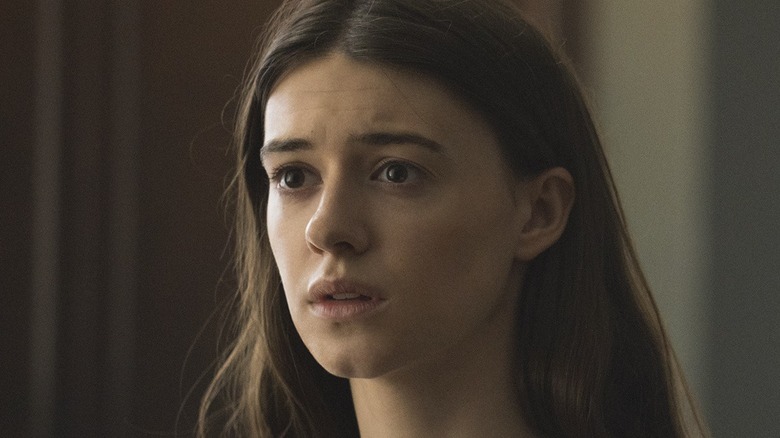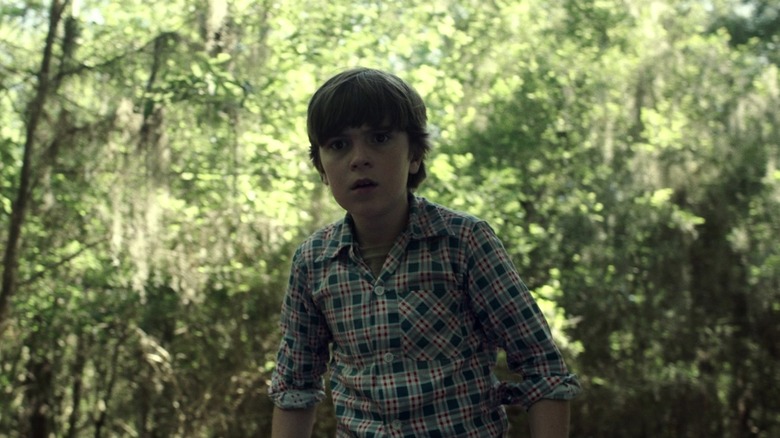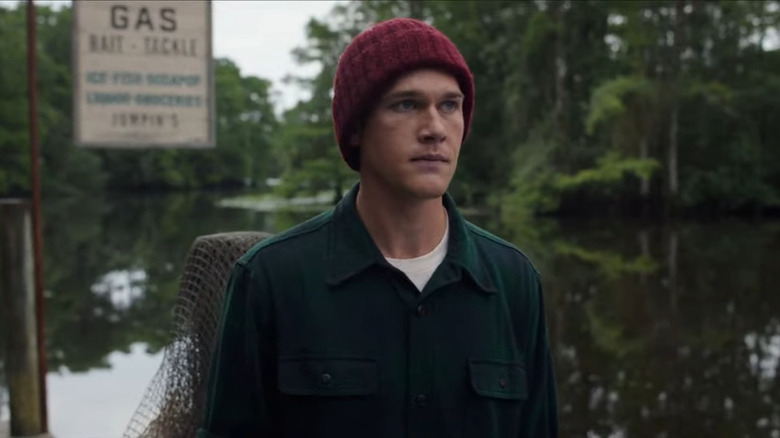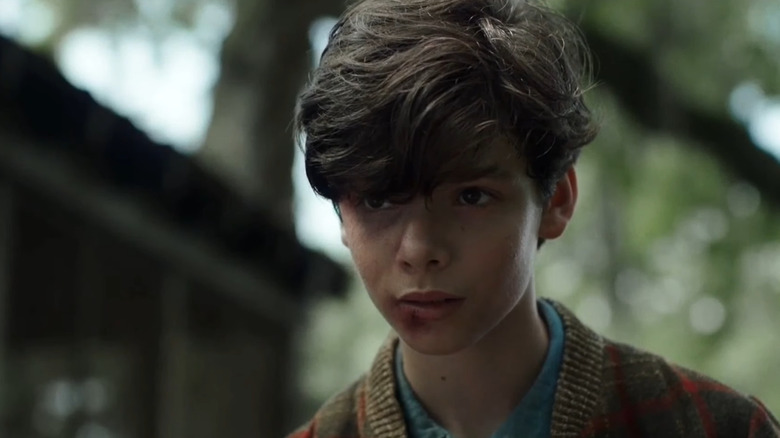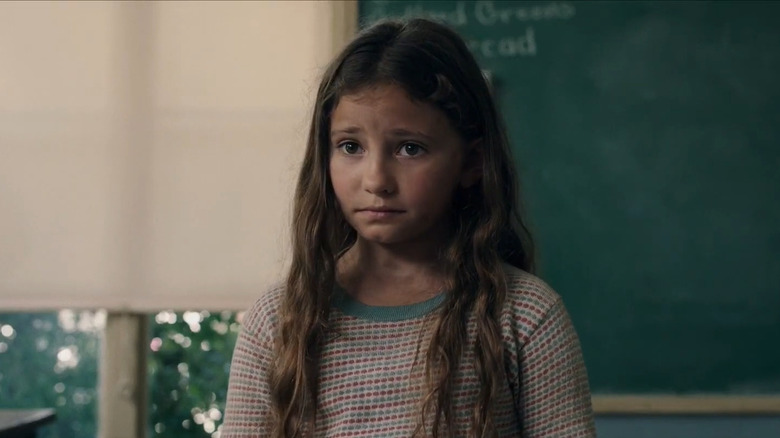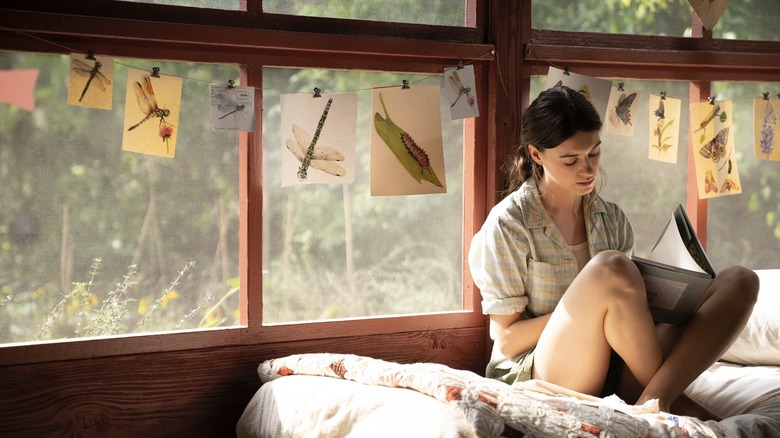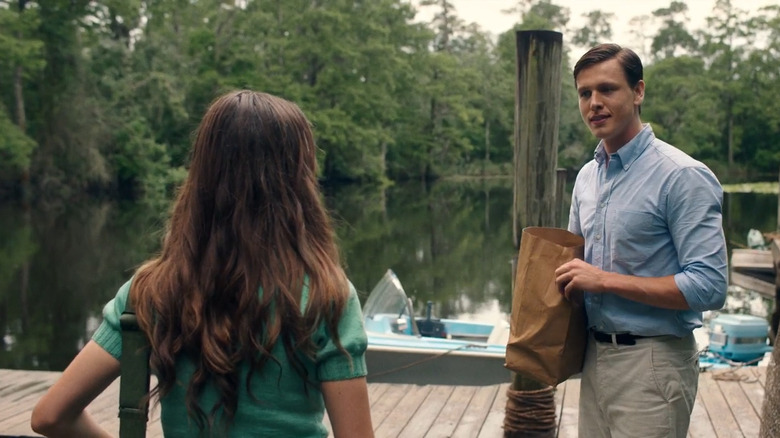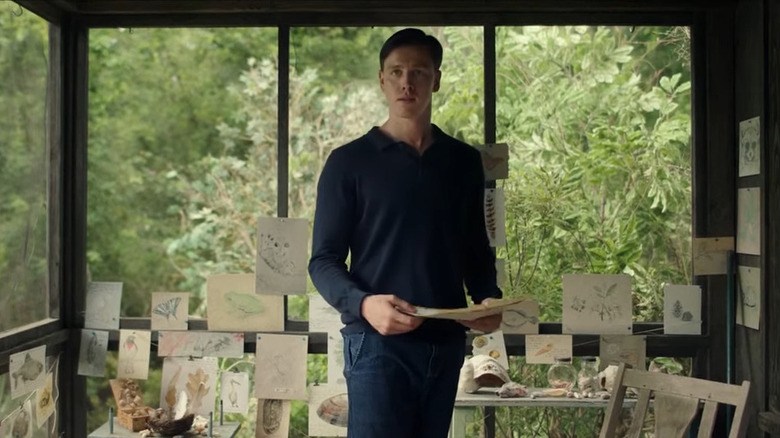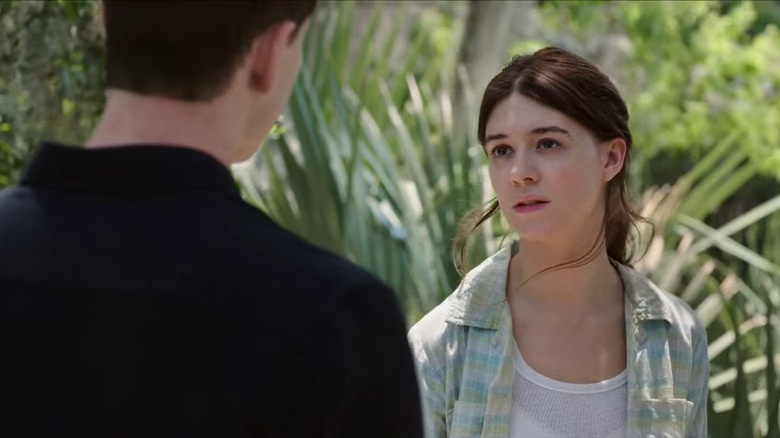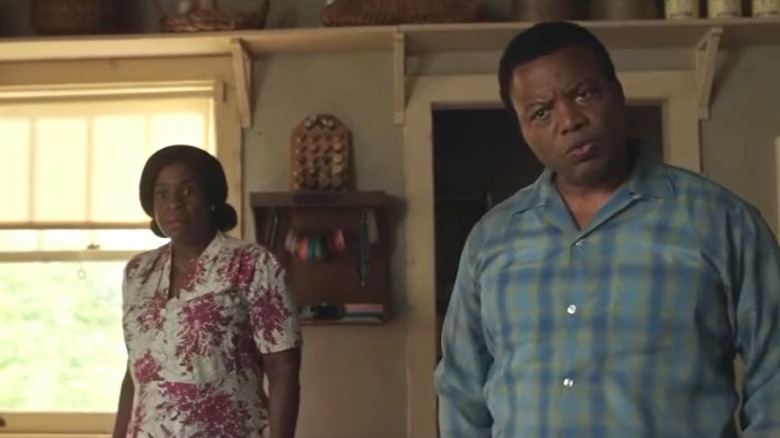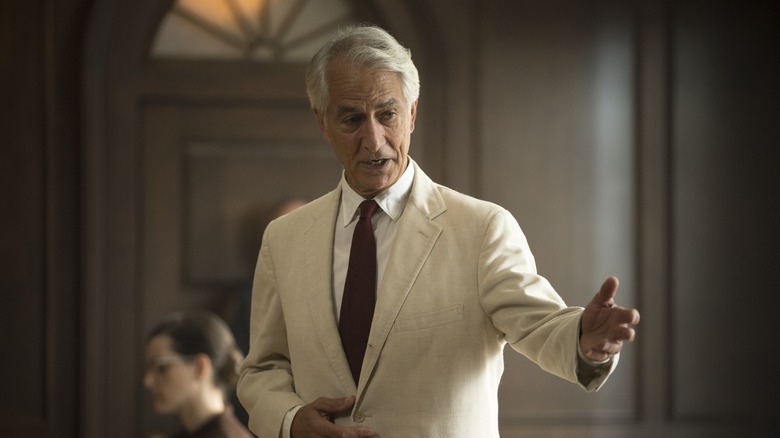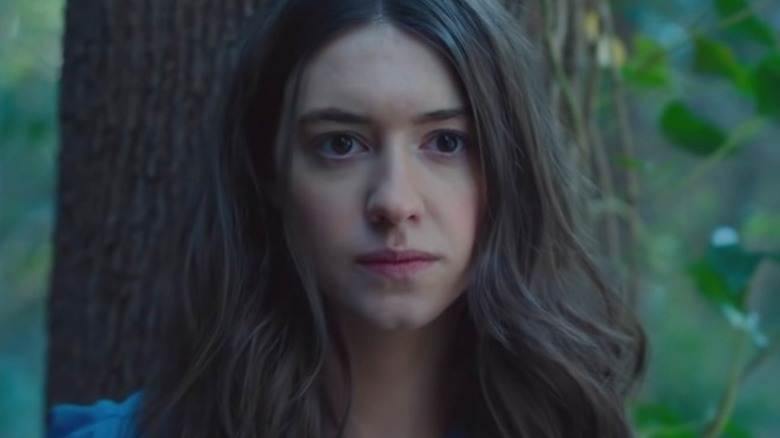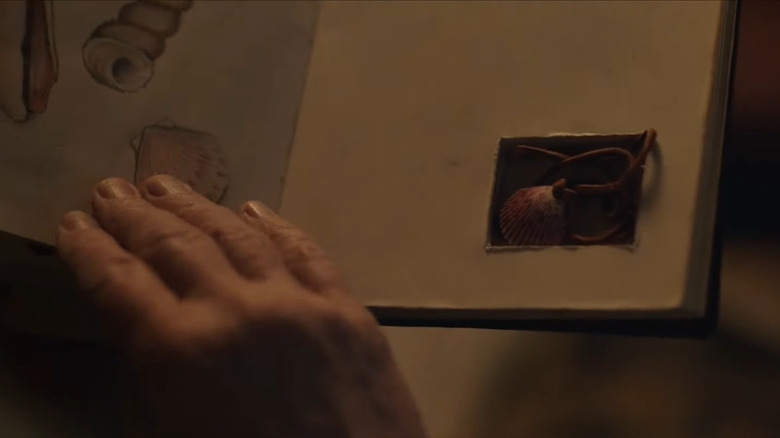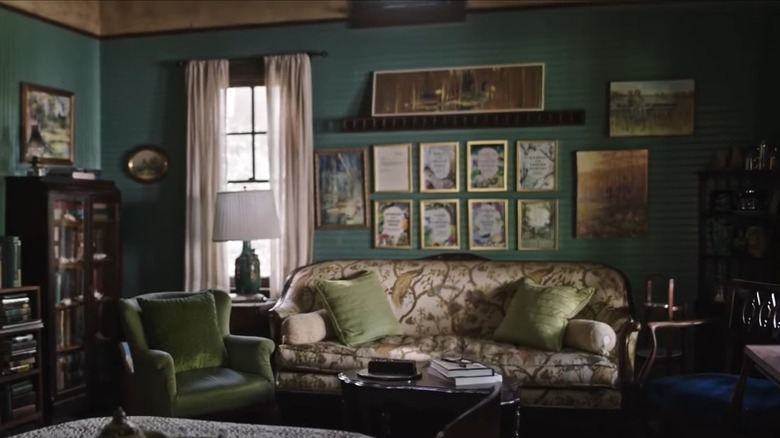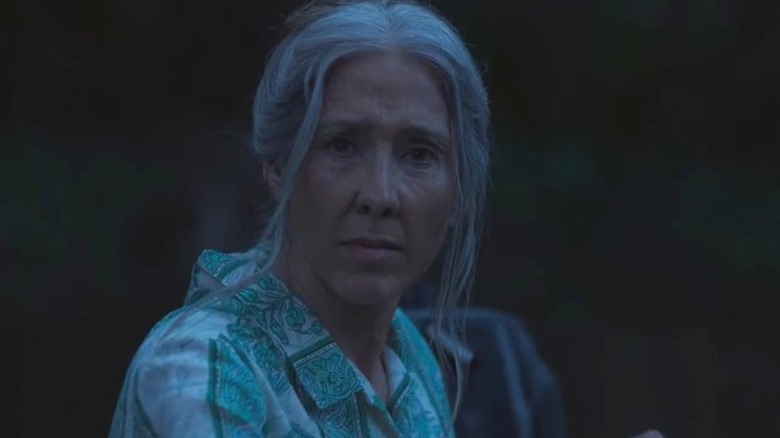Small Details You Missed In Where The Crawdads Sing
Trigger warning: The article discusses allegations of domestic abuse and sexual assault.
The 2022 film adaptation of Delia Owens' 2018 best-selling novel "Where the Crawdads Sing" brought a beloved coming-of-age story, intertwined with a compelling murder mystery to the screen. Although the film wasn't a hit with critics, it has proved to be popular on Netflix with an almost perfect audience score on Rotten Tomatoes.
"Where the Crawdads Sing" tells the story of Kya (Daisy Edgar-Jones), an outcast known in the fictional town of Barkley Cove as the "Marsh Girl." The film begins with two boys finding a body in a swamp. Kya is arrested and tried for the alleged murder of Chase Andrews (Harris Dickinson) who was rumored to have had an illicit relationship with Kya before his death. We see Kya's life through flashbacks, telling the story of a young girl who essentially raised herself in a North Carolina marsh after her family abandoned her to escape her abusive father (Garret Dillahunt).
Kya's life is one of isolation and poverty. After her father vanishes, she learns from nature how to survive, and about human kindness from James "Jumpin'" Madison (Sterling Macer Jr.) and his wife Mabel (Michael Hyatt) who runs a general store. As a teenager, she learns about love from Tate (Taylor John Smith), the college-bound son of a shrimper, and she later learns of betrayal from Chase. Keep reading to explore details you missed (with spoilers) and how the film was telling you its secrets all along.
The opening monologue hints at the identity of Chase's killer
"Where the Crawdads Sing" borrows liberally from the lyrical prose of Delia Owens' novel to create Kya's first-person narration. Although this is a coming-of-age story about an abandoned girl surviving and a young woman thriving as a writer and naturalist because of her kinship with the marsh environment she grew up within, it is also a murder mystery about who killed Chase Andrews.
Although the novel begins with Kya's childhood, the film kicks off with two boys finding a body at the base of a fire tower in a swamp. Kya's opening monologue in the film actually gives us a not-so-subtle hint about the identity of the killer. When Kya says, "A swamp knows all about death and doesn't necessarily define it as tragedy, certainly not a sin," we gain insight into her moral foundation.
From the very beginning, it is clear that Kya, or the "Marsh Girl," is an outcast. She was raised by the marsh and all the wild things that live there. Because of this affinity with nature, and her work as a naturalist, she doesn't ascribe to the norms, mores, and rules of the people in town. We learn at the very start that Kya believes death is part of the circle of life, and she doesn't think it's tragic.
The truth about the red knit hat
The red knit hat quickly emerges as an important clue in the murder case because the red fibers on Chase's jacket match the hat found in Kya's cottage by the police before her arrest. During the trial, Kya's lawyer, Tom Milton (David Strathairn), argues that the fibers from the hat could have been transferred to Chase's jacket at any time while he was seeing Kya and that it doesn't prove that Kya saw Chase the night of his death, nor that she killed him.
In a flashback, we see Tate wearing the hat as he scuffles with Chase on the dock outside Jumpin's store after Chase was talking trash about Kya to his friends. If you believe Kya is innocent, this scene suggests this is when the fibers were transferred to Chase's jacket from the hat. Later in the film, we see Tate give the hat to Kya when she is hiding from Chase outside her cottage.
This series of events seems to exonerate Kya from the crime, explaining both how the fibers got on Chase's jacket and how the hat arrived in Kya's home. The twist ending of the film, where an elderly Tate discovers Kya had killed Chase, reveals the red hat was simply a MacGuffin (something Hitchcock loved to use); completely unrelated to the murder and inserted into the story to both advance the plot and create reasonable doubt in the audience.
Jodie was the only person who said goodbye to Kya
Abandonment marks Kya's life. Anyone she's ever loved leaves her, even Tate when he goes away to college and doesn't return on the 4th of July as he promised, and neglects to send a letter explaining why. Kya's mother (Ahna O'Reilly), sisters, older brother, and father all walked away from the family cottage in the marsh without saying goodbye to Kya as she watched them walk out of her life.
Her brother Jodie (played by Will Bundon as a child), is the only person to take the time to tell her he was leaving. That he cared enough to say goodbye, and later to come back looking for her when they are grown, is why Kya is willing to forget the hurt of the past and welcome Jodie (Logan Macrae) and his family into her life after years of separation.
As Aslıhan Alp of The Stanford Daily pointed out: "Their reunion gets lost between the trial and flashbacks, and at the movie's conclusion, it's unclear how the siblings got so close with only one meeting." Because the filmmakers streamlined a 368-page book into a two-hour and five-minute film, some areas suffered, including Kya's special bond with her brother which was explored more fully in the novel. Although some details were lost in translation, the spirit of the novel remained true.
Kya may have been dyslexic
In "Where the Crawdads Sing," Kya didn't learn to read until Tate taught her as a teenager. The obvious explanation for Kya being a late reader is that she was an abandoned child who didn't learn to read before her mother left. Kya only went to one day of public school, when Mabel told her she could get a good meal and meet kids her own age if she went. Unfortunately, Kya's experience at school in Barkley Cove is unpleasant, and she learns the cruelty children are capable of, explaining through narration: "That was the only day I ever spent in school. Reckon I was better off learning from the wild."
During her one day of school, Kya does something revealing. When the teacher asks Kya to spell the word "dog," she instead spells "God." Children with dyslexia often need specialized one-on-one instruction to learn to read and can often flip words around or spell words with the letters out of order and struggle to sound them.
Kya not learning to read from her mother before she left, and later learning through one-on-one tutoring from Tate may have been a subtle hint that Kya was dyslexic and needed to learn to read in a different environment than was available at her public school. Being neurodivergent certainly could also be a source of Kya's artistic talent and creative thinking.
The animal life in the marsh is part of the sound design
"Where the Crawdads Sing" has a beautiful soundtrack topped off by Taylor Swift's gorgeous original song, "Carolina," playing during the end credits of the film. Appearing in a live stream with producer Reese Witherspoon and actors Daisy Edgar-Jones and Taylor John Smith, director Olivia Newman shared how "[Swift] wrote this gorgeous letter to us explaining how they chose instruments that were only available before 1953 and she recorded it in one take the way they recorded songs at the time."
One detail you may have missed was how loud the animal life is in the marsh and that it is an integral part of creating the environment for the audience. In the same live stream, Newman spoke about how nature sounds contribute to the story, saying, "It was also surprising how loud it is at night," relating how Delia uses the noises of the night in the novel to emphasize how alone Kya feels after her father vanishes.
Kya narrates, "Being so completely alone is a feeling so vast, it echoed," before we watch the child drag her mattress out to the screened-in porch to sleep near the sounds of nature. Newman shared that she realized while shooting the scene "because there was so much sound in the marsh, [Kya] felt less alone the closer she could get to it." Although the story takes place in North Carolina, the film was shot filmed in Louisiana.
It's obvious from the beginning Chase was going to be trouble
The very first time Chase speaks to Kya, it's obvious he's going to be trouble. Roger Ebert film critic Christy Lemire attributes Kya's naivete to her social isolation, saying she is "unable to recognize" the red flags because of her limited experience. Although Chase is polite and asks to carry Kya's grocery bag from Jumpin's store to her boat, the fact that he doesn't accept no as an answer is our first hint that he doesn't respect boundaries.
According to Prevention Magazine, crossing boundaries is a red flag and "boundary crossing tends to be a slippery slope — if they cross a boundary more than once, they're likely to keep crossing more boundaries over time." This is something Chase proves not once, but twice on their first date. During their beach picnic, Chase kisses Kya too aggressively, crawling on top of her on the beach. Although he apologizes, soon after he is pressuring her to show him her isolated cottage, which Kya is obviously uncomfortable with, but allows.
Even when Chase is in her house, he touches her things, looks through her drawings and paintings, and tosses them aside. Although Kya knows everything about wildlife and the rhythms of nature, she knows very little about human nature, only having Jumpin' and Mable, Tate, and her dad to use as examples. Despite having an abusive father, Kya knows nothing about the early signs of abuse.
Kya was drawn to Chase because he was like her father
Sadly, the cycle of abuse is often generational, being repeated by those who grow up in abusive homes. Sometimes those who have been abused become the abuser, and other times they can become involved in future abusive relationships. Chase shows Kya who he is on their first date, and during their brief relationship, we learn Chase's father is an abusive drinker when he confides in Kya about his dad knocking his mother around and telling him his friends wouldn't like him if they really knew him.
Kya is drawn to Chase because she senses he won't judge her for growing up in an abusive home. She doesn't understand that this shared history might actually contribute to Kya and Chase recreating the abusive homes they were raised in. In the film, it seems Kya thinks Chase is attractive, so she gives him a chance, getting sucked in because she is naïve and lonely.
We see Chase doesn't know how to relax or celebrate without a six-pack, which is a subtle detail Chase might be more like Kya's father than she realizes, and she is drawn to the familiarity. When Chase assaults Kya on the beach after she breaks things off, discovering he was engaged the entire time they were dating, Kya understands why her mother abandoned her children and ran away, saying: "One thing I learned from Pa, these men have to have the last punch."
Another hint in narration
While hiding in the dark near her dock, Kya narrates: "Being isolated was one thing. Living in fear, quite another. I will never live like that — a life wondering when the next fist will fall." It isn't only this narration that suggests a plan is forming within Kya's mind. When Chase assaults her, Kya fights back and tells him if he comes near her again, she will kill him. She's standing her ground, despite what he did to her.
As Tate told Kya when he returns to Barkley Cove after college to work at the biological research center near the town, he doesn't believe she can live outside the marsh and felt he had to choose between her and everything else the world could offer, so he chose the latter, despite regretting it. Taylor John Smith (who plays Tate) told The Hollywood Reporter in an interview: "I think he was wrong."
Chase's assault on Kya awakens childhood trauma, putting her in a flight or fight survival mode. It also helps her understand why her mother left, but unlike her, Kya isn't hatching a plan to run away from Chase. Kya is lying in wait with a rock in her hand, prepared to defend herself and her home, which Chase trashed. Kya will protect her territory, just like the wild things in the marsh would.
Both Tate and Jumpin' knew when Kya was going to be in Greenville
"Where the Crawdads Sing" does a great job of creating reasonable doubt without outright accusing someone of Chase's murder. Both Tate and Jumpin' know Chase hit Kya, and they also know when Kya is going to be in Greenville, planting the seed of doubt in our minds, and making us believe it's possible either of the men was the killer.
It is Tate who arrives at Kya's dock while she waits for Chase with a bruised face in the dark. Tate encourages Kya to go to Greenville to meet her editors and stay there for a while if she can. When Kya goes to Jumpin's store to copy the bus schedule to Greenville, he sees her bruised face. Kya tells him she won't go to the police because she knows what they will put her through and how it will only further tarnish her already eccentric reputation. Jumpin' tells her he worries about her out in the marsh by herself, insisting to know when she's gone, and Kya tells him when she will be in Greenville.
Kya's lawyer never outright suggests Tate or Jumpin' killed Chase, but he certainly considers the possibility the night before closing arguments when he sees Tate hug his father on the dock in town. Although it seems unlikely either Jumpin' or Tate did it, they were both very protective of Kya, creating alternate possibilities for the audience and the jurors to consider.
Kya's lawyer evokes Matlock with his light-colored suit
Kya's lawyer, Tom Milton, who comes out of retirement to represent Kya, is referred to as an "Atticus Finch-like defense attorney" by A. O. Scott of The New York Times, but this character is clearly evoking one of television's most iconic lawyers with the light-colored suit he wears in the courtroom during his closing arguments. Anyone who read "To Kill a Mockingbird" or watched "Matlock" on television in the '80s and '90s knows what we're talking about.
Milton is clearly an amalgamation of the two famous lawyers, borrowing his oratory style and social consciousness from Atticus Finch from Harper Lee's award-winning novel and his fashion savvy and cross-examination skills from Matlock. Despite this reduction of his character to literary and TV tropes, David Strathairn brings kindness and gravitas to the role, while also making it clear Milton has held himself back from the community, trying to maintain impartiality until he defends this ostracized young woman.
Kya's meeting with her editors
When Kya has dinner with her editors in Greenville, the night Chase dies, she tells them about the insects she is studying for her next book, sharing how female fireflies have two different lights for luring male fireflies; one for mating, and one for killing. Everyone jokes about these insects being evil, but Kya tells them: "I don't know if there is a dark side to nature, just inventive ways to endure against all odds."
We see this dinner party conversation during a flashback while her editor is questioned in court about their meeting and Kya's behavior at breakfast in Greenville the next morning, which he characterized as being completely ordinary. This statement about there being no dark side in nature is incredibly revealing and doubles down on Kya's opening monologue during which she states death isn't a tragedy, nor a sin.
The shell necklace was always the key clue
Although we're led to believe the red hat was the key to discovering who the killer was, it was always the shell necklace we should have been paying attention to. The irony is that Chase's mother tells everyone this during the trial, claiming Kya killed her son and took the necklace she gave him back, but she is perceived as hysterical rather than observant. The necklace represents the pieces of herself Kya gave Chase while dating, and after killing him, she symbolically took those pieces back by reclaiming the item.
When an elderly Tate finds the shell necklace hidden in one of Kya's journals after her death with an illustration identifying Chase as a predator and Kya as prey, he realizes the truth and that Kya took this secret to her grave despite sharing her life with him. Olivia Newman told The Hollywood Reporter in an interview: "I think Kya is a real enigma, and there is something very mysterious about her."
Tate keeps Kya's secret too, dropping the shell on the beach so it can go back to where it came from. In the same interview with THR, Smith said, "I think we're all human. We all make mistakes... sometimes mistakes are a little more permanent than others." Smith believed Tate could accept this information about Kya because Tate felt like he had made a mistake when he left her.
Kya published 7 books
At the end of "Where the Crawdads Sing," after Kya's death, we see her cottage at the edge of the marsh, as Tate wraps up the specimens to send to North Carolina University to be displayed in their collection. As the camera pans around the living room, we see seven books framed and hung on the wall above the couch. It appears Kya published three more books after Jumpin' died because he only displayed the first four books in the windows of his store in the montage we see following the trial.
One message of the film that can't be understated is the effect people can have on others' lives. Kya never would have become a writer and well-respected naturalist if Tate hadn't taught her to read. Despite being abandoned and ostracized, Kya carved a life for herself out of the environment that taught her how to survive. Daisy Edgar-Jones told IndieWire in an interview: "What I like about all the characters that I've been lucky enough to play is that they are complicated, and I think that's something that is important to represent on screen, actual women, who are layered and complex and flawed in many ways and resilient and often underestimated."
The final monologue confirms Kya killed Chase
Despite the film incorporating misdirections to create reasonable doubt, Kya was telling us the truth the whole time. Since childhood, the rhythms of nature have guided Kya's life, and she does not believe nature has morality. In the end, she says, "The marsh knows all about death... It understands that every creature does what it must to survive and that sometimes for prey to live, its predator must die. I am the marsh now. I am the firefly."
The film never shows us how Kya killed Chase, but in this monologue, she admits to killing Chase when she says, "I am the firefly." Olivia Newman told The Hollywood Reporter: "The film is set during a time in which women who were victims of domestic violence didn't have much recourse. So I think this idea of women having to save themselves is unfortunately something that resonates today."
There has been some criticism of "Where there Crawdads Sing" because of the controversy surrounding Delia Owens being wanted for questioning in a murder investigation and then later writing the novel. This moral ambiguity is a perfect reflection of the film's complex heroine. Director Newman told Newsweek she hoped the ending of the film "inspires a lot of conversations."
If you or someone you know is dealing with domestic abuse, you can call the National Domestic Violence Hotline at 1−800−799−7233. You can also find more information, resources, and support at their website.
